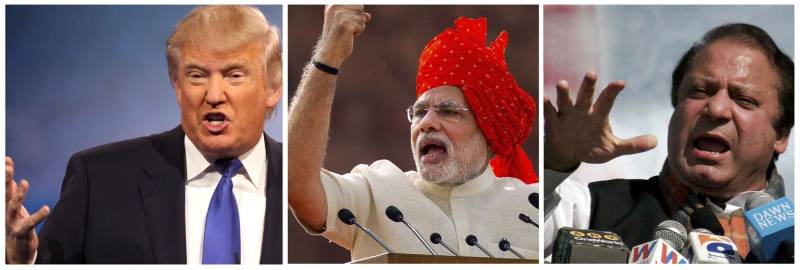In May when Freedom Party’s (Freiheitliche Partei Osterreichs – FPO) Norbert Hofer was a 0.3% vote swing away from becoming the Austrian President, many had feared a far-right chain reaction across the West. The sheer thrust of the propeller delinked the English Channel and then sent a domino crashing into the Statue of Liberty last week.
Hofer now has the chance to become the first far-right head of an EU state since the end of World War II on December 4, after the May elections were annuled over voting irregularities. The Freedom Party’s win in May would’ve rattled the liberal cage with a sledgehammer, but now that Brexit and Donald Trump have happened since then, the far-right’s European takeover seems inevitable.
The Dutch Freedom Party (Partij voor de Vrijheid – PVV) would flex its electoral muscles on March 15 with Geert Wilders and his anti-immigrant rhetoric striking many a chord in Netherlands. Following Trump’s win France’s Front National party spearheaded by Marine Le Pen is being considered a serious contendor going into the April-May presidential elections after gains in last year’s regional polls.
Le Pen’s win in France would sound the death knell for the European Union. And by the time German elections come next September right-wing Eurosceptic Alternative fur Deutschland (AfD) entering the Bundestag will become a formality. According to The Economist’s poll, 9 out of 10 members of Pegida (Patriotic Europeans Against the Islamisation of the West) back the AfD while Marine Le Pen went on trial last year over anti-Muslim hate speech.
The far-right’s rise in the West has been facilitated by the left embracing neoliberal economism and abandoning the working class. This has resulted in ‘liberalism of the rich’ spearheaded by the corporate professional class – epitomised by the Clintons – with the far-right successfully tapping into the blue-collar vote-bank to cash in on economic inequality. That a multi-billionaire real estate tycoon summoned a convincing rallying cry for the working class in the US, underscores the dire straits that the Democratic Party finds itself in.
The anti-immigrant manifestations of Trump -– much like Le Pen, Wilders and Frauke Petry – synthesise a venomous supremacist ideology using valid class resentment as its basic ingredient. Selling the idea that ‘foreigners’ have taken up jobs and welfare reserved for the ‘original inhabitants of the land’ becomes easier when these economically deprived ‘nationalists’ are also told that they are a superior people.
The intersectionality of the adhering ideas, thence, musters the working class, white nationalists, anti immigrant and anti-Muslim groups into one large supremacist umbrella. It is an offshoot of the early 20th century fascist movements, with ‘foreign immigrants’ replacing ‘foreign powers’ as the touted cause of economic plunge.
While white nationalism is driving these movements in the West, similar mergers between economic reform and supremacism have already been witnessed in India and Turkey. Narendra Modi’s ‘Gujarat model’ gave the Hindu right-wing the political alibi for the 2002 Muslim massacre in the same state. This merger between ‘Modinomics’ and Hindutva gave BJP the biggest election win in India in three decades. While Modi hasn’t addressed poverty – neither as Gujarat Chief Minister nor as the Indian Prime Minister – his successful wooing of the urban middleclass, showcases the electoral potency of supremacist ideologies once you identify the decisive economic demographic. With Modi now embracing neoliberalism, it’s the turn of the Indian working class to feel alienated, as illustrated by more than a million workers going on strike in September.
The insecurity driven supremacist ideology is further bolstered by terrorism, with even the traditional right transacting through an exchange of liberties for security. The 2008 Mumbai attacks added to this insecurity in India. Similarly, the cornerstone of the rule of Recep Tayyip Erdogan and his Justice and Development Party (AKP) in Turkey has evolved from economic development to their peddled position on the growing terror attacks in the country. It is the public sentiment mustered through their counter-terror stance – albeit duplicitous – that helped AKP regain Parliamentary majority in November last year, following a hung parliament in June, and ensured that Erdogan warded off a coup attempt in July this year.
With the ISIS-orchestrated jihadist terror attacks strengthening the right in Turkey, a Muslim majority country, its impact on Western states can be imagined. Every refugee fleeing war-torn countries has therefore been identified as a terror threat and an economic liability, reaffirming immigrants as the scapegoats for the left’s failures.
Similar scapegoating has been conspicuous in Pakistan, where the nation collectively mourned Trump’s triumph while Sharbat Gula was being deported out of the country, with 2.5 million of her compatriots expected to follow suit.
While Pakistan does not have a traditional left-right political schism, the rise to power of the PML-N (traditionally centre-right) in 2013 at the expense of the PPP (perceived as left) had a lot to do with the former’s economic vows and the latter’s shambolic governance. The realisation of PML-N’s ‘Roshan Pakistan’ was facilitated by alliances with Islamofascist anti-Shia groups like Ahle Sunnat Wal Jamaat (ASWJ) in Punjab, further showcasing the coalition potential of supremacism and economic reform.
Even though the PML-N has since vied to implement appreciable social reforms to target religious extremism and gender discrimination, its pursuance of neoliberal economism – as epitomised by the China Pakistan Economic Corridor – continues to betray the working class in Pakistan.
Trump’s win might have thrown the spanner into the works, but the double pin wrench has been welded together using years of discontent overlooked – if not exacerbated – by the left. Without abandoning the progress that social liberalism has made, the left needs to return to economic egalitarianism as its number one goal. For, superstructures of social equality can never be built over cracks of class disparity.






